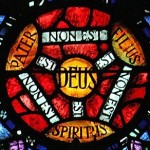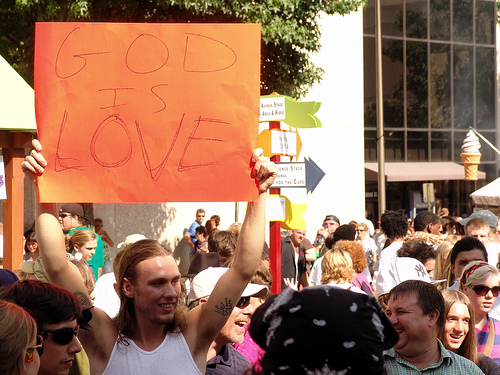We run our website the way we wished the whole internet worked: we provide high quality original content with no ads. We are funded solely by your direct support. Please consider supporting this project.
Are We Supposed to Balance Love and Truth?
Often people say, “Yes we must love. But we must balance love with truth.” “Love has its place, but we must not forget God’s wrath.” “Love must never take the place of correct biblical doctrine.”
Two points need to be made.
First, if we take seriously the biblical teaching that the love command is the greatest command, that we must put it above all other considerations, that we must clothe ourselves with and even live in love, then there can be no thought of balancing love with any other concern. Nothing can qualify a command that is “above all” other commands. (Col 3:14). If the command is to love everyone as Christ loves us, there is simply no situation in which the command does not apply.
Because the command to love is the central biblical doctrine, it is the only one we can, and must, hold in an “unbalanced” way. Put differently, the only way to be “balanced” in our understanding and practice of love is to see all other commands as aspects of it, not competitors alongside of it.
We have to wonder where anyone got the idea that love in any way competes with truth, holiness, or biblical doctrine. Love is the central biblical truth; it is the essence of all holiness; it is the most important biblical doctrine. Every truth, every deed, every teaching is reduced to nothing more than religious noise when it isn’t placed under and clothed in the commandment to love.
Second, any attempt to qualify God’s love with another attribute—God’s wrath, for example—amounts to a fundamental denial of the centrality of the revelation of God in Christ. For Christ reveals God’s holiness and wrath against sin precisely as he reveals God’s love for sinners. Indeed God’s holiness and wrath are what God’s love looks like against sin.
Love defines every aspect of the Christian’s life, for love ultimately defines every aspect of God’s life. Indeed, we may more specifically say that as Christ defines every aspect of the Christian’s life—for Christ is the definitive revelation of God’s love—so Christ defines every aspect of God’s life. All the attributes of God are to be defined by Christ. In the crucified Messiah we see God’s just and holy wrath against sin, but we see it as a manifestation of God’s love. Out of love for sinners, Christ bore our sin and suffered the wrath of God’s punishment on the cross. All that God is, dwelt in Christ (Col 2:9). Everything God does, even his expressions of holy wrath, are done out of love.
We are only balanced in our understanding of love when we understand that it is the one thing we must live in—to all people, at all times, in all situations, without exception. If we do this, everything else we need to do will get done. If we don’t do this, there’s simply nothing else worth doing.
How much harm has been done to the church and to the cause of Jesus Christ because Christians have placed other considerations alongside or above the command to love as God loves? In the name of truth, Christians in the past have sometimes destroyed people, even physically torturing and murdering them. In the name of holiness, Christians have often pushed away and shamed those who don’t meet their standard, creating their own little holiness club to which struggling sinners need not apply. And in the name of correct biblical doctrine, Christians have frequently destroyed the unity of the body of Christ, refusing to minister or worship together because of doctrinal differences, sometimes viciously attacking those who disagree with them.
The unsurpassable worth of the person who doesn’t share our truth, doesn’t meet our definition of holiness, or doesn’t agree with our “correct biblical doctrine” has all too often been neglected or denied. Which means that in such cases the truth, holiness, or correct doctrine we defended was altogether worthless: clashing cymbals, resounding gongs, religious noise, nothing more. (1 Cor 13:1-3)
—Adapted from Repenting of Religion pages 57-60.
Category: General
Tags: God is Love, Holiness, Love, Love One Another, Repenting of Religion, Truth, Wrath
Related Reading

N.T. Wright: Truth Happens
N.T. Wright talks about the relationship between truth and beauty. Lovely.

A Cruciform Dialectic
One of the most important aspects of God’s action on Calvary, I believe, is this: God revealed himself not just by acting toward humans, but by allowing himself to be acted on by humans as well as the fallen Powers. God certainly took the initiative in devising the plan of salvation that included the Son…

Love and Violence
What does it mean to confess that “God is love” and that we are called to “live in love” (Eph. 5:2)? One of the more common ways of understanding God’s love has its roots in the teachings of Augustine. He adamantly affirmed that the revelation that “God is love” lies at heart of the Gospel…

Does the Doctrine of the Trinity Matter?
Jesus reveals the greatest, most beautiful, and mysterious aspect of God when he, despite being himself God Incarnate, relates to God as his “Father” and refers to God as “the Holy Spirit.” There is, of course, only one God (1 Cor 8:6). Yet Jesus reveals that God somehow exists as Father, Son and Holy Spirit.…

The Jesus Story is a Myth!…And History
Image by Len dela Cruz The Jesus story has a curious, and fascinating, relationship with myth and legend. The story of God coming to earth, being born of a virgin, manifesting a heroic, counter-cultural love toward outcasts, dying for the people who crucified him and then rising from the dead has a familiar “echo” to it.…

Sermon Clip: Extravagant Forgiveness, Extravagant Love
Greg Boyd had the wonderful opportunity to guest speak at a great church in Carlisle, PA called Carlisle BIC. He spoke on the topic of forgiveness and love. In this short clip, Greg describes how a prostitute was being judged by the Pharisees, but Jesus came to her rescue. You can listen to the full…

